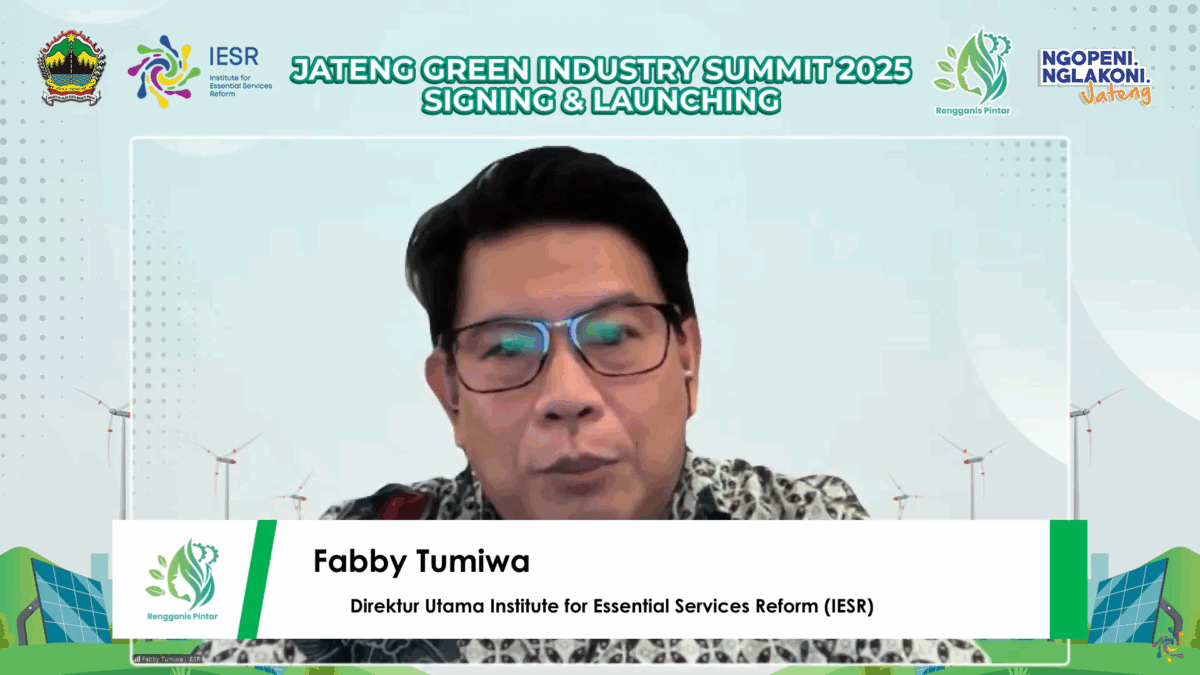Jakarta, September 15, 2025 – The industrial sector is one of the main drivers of Indonesia’s economy and the third-largest contributor to emissions after power generation and transportation. In 2024, industrial emissions in Indonesia reached 452 million tons of carbon dioxide equivalent. Amid global market trends demanding low-carbon products and services, Indonesia’s industrial sector must transform towards greener, low-emission practices to remain competitive both internationally and domestically. This transformation is also a vital contribution to achieving national decarbonization targets by 2050.
Central Java contributes 8.5% to the national GDP. In the second quarter of 2025, Central Java’s economy grew by 5.28 percent compared to the same period in 2024, surpassing the national average growth rate. This growth was primarily driven by the manufacturing industry, which accounted for 96.25% of the increase. Moreover, during the first six months of 2025, Central Java recorded realized investments of IDR 48.58 trillion from Foreign Direct Investment (FDI) and Domestic Investment (DI), as well as IDR 10.6 trillion from micro and small enterprises.
At the Jateng Green Industry Summit 2025 (18/9/2025), organized by the Institute for Essential Services Reform (IESR) and the Central Java Provincial Industry and Trade Office, Central Java Governor Ahmad Luthfi highlighted the provincial government’s commitment to advancing green economic independence. He has issued Central Java Governor Circular Letter Number 500.9/0006073 of 2025 on “Accelerating the Energy Transition Through the Use of Renewable Energy in the Industrial Sector.” Notably, Central Java is the only province that offers tax incentives to businesses and industries implementing green economy practices.
“In line with Central Java’s development planning policy, by 2028 the focus will be on improving and equalizing the economy through village potential and green industry. Green and blue economic independence will serve as a foundation of excellence, as outlined in the roadmap and implemented across various regions, including regencies,” he said in his speech.
Fabby Tumiwa, Chief Executive Officer (CEO) of IESR, noted that Central Java holds a unique and strategic position. With its diverse manufacturing base, industry contributes one-third of the province’s economy. However, economic activities still rely heavily on fossil fuels such as coal and oil, leaving the manufacturing sector exposed to global pressures, particularly from export destination countries. The European Union, for example, has implemented the Carbon Border Adjustment Mechanism (CBAM) and sustainability standards requiring low-emission products. Without timely transformation, industries in Central Java risk losing their competitiveness in the global market.
“The adoption of renewable energy, energy efficiency measures, and the circular economy can all be implemented by industries in Central Java. Rather than being viewed as a burden, the push for decarbonization and the development of green industry should be seen as a strategy to lower operating costs, strengthen competitiveness, expand market access, attract green investment, and increase profits for businesses, while also creating new jobs in the industrial sector,” Fabby explained.
He further emphasized that the role of both central and regional governments is crucial in guiding and driving green industry transformation through policies, regulations, and incentives. This will encourage industries to reduce greenhouse gas emissions and waste, while making more efficient use of materials.
“The government also needs to strengthen the green industry ecosystem so that collaboration among industry, financial institutions, communities, consumers, and the government itself can function more effectively,” said Fabby.
At the 2025 Central Java Green Industry Summit, a Cooperation Agreement (PKS) was signed to accelerate green industry transformation. The agreement covers collaborative support through the Industrial Assessment Center (IAC) community, the development of green industrial zones, and the utilization of new and renewable energy. The signatories included IESR, the Central Java Provincial Industry and Trade Office, Diponegoro University, Sebelas Maret University, and the Batang Integrated Industrial Estate.

